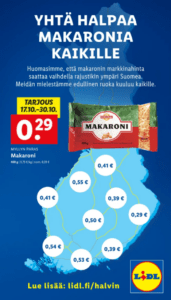Lidl Campaigns for National Pricing
Lidl Finland promotes nationwide price consistency, criticizing regional price differences among competitors, as earlier in Poland. The discounter highlights its commitment to uniform pricing despite challenges in a concentrated market.

Lidl rallies for nationally unified prices and advocates price fairness. This week, the German discounter launched a marketing initiative under the slogan ‘affordable pasta for everybody,’ highlighting price disparities in the Finnish grocery market. According to Lidl’s latest promotional leaflet, a local macaroni brand at a competing retailer varies significantly in price across the country, ranging from €0.54 in the most expensive locations to €0.29 in the cheapest—indicating a pattern of regional price differentiation.
Lidl’s Purchasing Director, Thomas Heinrichs, in a company statement emphasizes that such variability is not limited to regional differences. Even within the same city, stores under the same grocery chain set different prices, causing consumers to ‘pay different prices for food in different zip code areas.’ As an example, he pointed out that a particular coffee brand costs €2.59 in many Helsinki stores, while the same item is available for €1.15 in another store of the same chain nearby.
The discounter has previously addressed this issue in other markets. In Poland, the retailer publicly attacks market leader Biedronka for its regional pricing practices, claiming that despite localized price adjustments by competitors, Lidl still offered the lowest prices nationwide for a basket of 15 essential grocery items. The situation in Finland mirrors that in Poland: Lidl Suomi has yet to capture a double-digit market share, while domestic giants S Group and K Group collectively control over 80% of FMCG retail. The K Group’s franchise model allows store owners to independently set prices, resulting in regional variation. Although S Group follows a more centralized pricing approach, it also adjusts prices based on local market conditions.
Lidl, however, asserts that it maintains ‘99% the same prices in all stores,’ reflecting its commitment to an internationally standardized and centralized discount model. This national pricing strategy, while ensuring price consistency, comes with trade-offs. By not allowing for localized price differentiation, Lidl passes up opportunities to optimize margins at the store level, even if it remains the most affordable retailer within specific areas. Moreover, the adherence to national pricing can limit expansion into high-cost locations, such as city centers, where operating expenses are significantly higher.
Related news
Mere in Lithuania: Rapid growth and a hard discount niche left open by Lidl
🎧 Hallgasd a cikket: Lejátszás Szünet Folytatás Leállítás Nyelv: Auto…
Read more >Lidl Netherlands Aims For 46% Healthy Food Sales By 2030
🎧 Hallgasd a cikket: Lejátszás Szünet Folytatás Leállítás Nyelv: Auto…
Read more >Related news
Storck Hungária: new sales manager has arrived
🎧 Hallgasd a cikket: Lejátszás Szünet Folytatás Leállítás Nyelv: Auto…
Read more >(HU) A nap mondása
🎧 Hallgasd a cikket: Lejátszás Szünet Folytatás Leállítás Nyelv: Auto…
Read more >(HU) A nap mondása
🎧 Hallgasd a cikket: Lejátszás Szünet Folytatás Leállítás Nyelv: Auto…
Read more >








